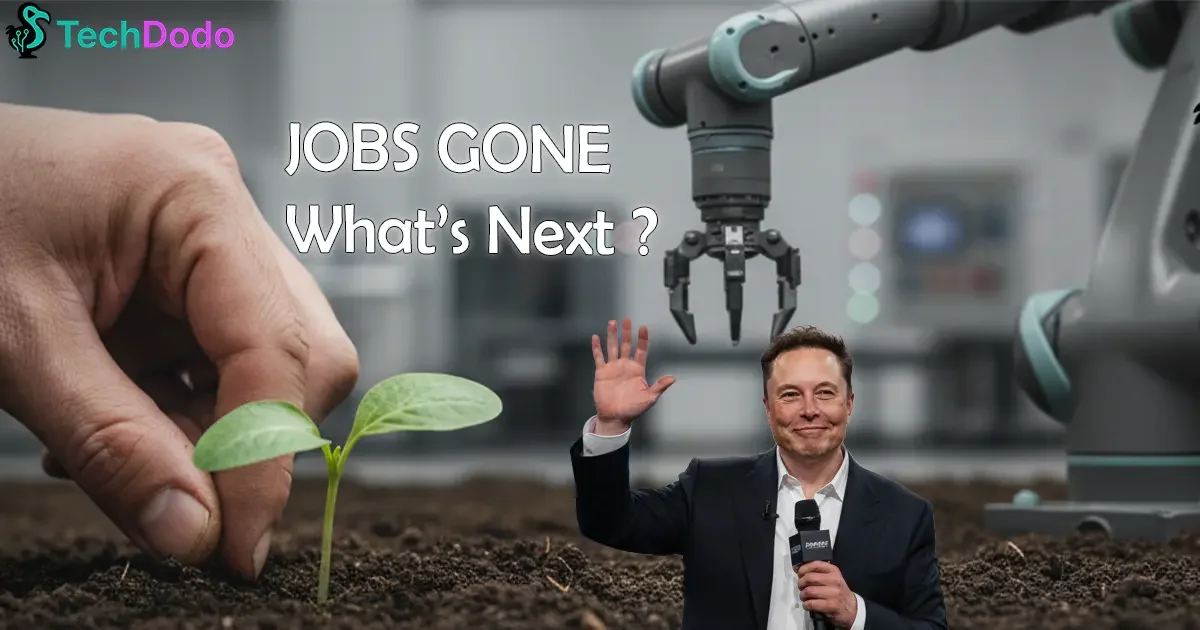AI Will Take All Jobs, Says Elon Musk — Here's What It Means for India
Imagine walking into your office one morning and finding it empty. Instead of heading to a desk, you stroll out into your backyard and plant vegetables. Sounds absurd? Not if Elon Musk has the future right. He recently declared that artificial intelligence (AI) and robots will eventually replace all jobs — and working will become optional.
That’s a provocative stance, especially in the Indian context where employment is the bedrock of household security. So what’s the deal — and how should tech professionals or policy watchers in India interpret this?
What Musk said — and what he means
Musk made his remark in response to a social-media post referencing a report about Amazon’s plans to replace hundreds of thousands of jobs via automation. He wrote:
“AI and robots will replace all jobs. Working will be optional, like growing your own vegetables, instead of buying them from the store.”
In a wider interview earlier, he stressed that a benevolent AI-future would mean goods and services become “basically next to nothing”, with many jobs becoming unnecessary.
Put together, the argument: if machines can do virtually everything humans do — and do it cheaper or faster — then humans might be liberated from work, and the big question becomes: what will we do with that freedom?
Why it matters — for India especially
India is in a distinctive position. On one hand:
- The country has a large workforce (~500 million) with a heavy reliance on labour-intensive sectors (agriculture, construction, manufacturing).
- On the other hand: India’s tech and services sectors are rapidly integrating AI, automation and robotics.
If Musk is even partly correct, the implications for India are multifold:
- Job displacement risk: Automation may hit roles ranging from data-entry and call-centres to manufacturing and logistics — all key employment streams in India.
- Skill transformation: The value might shift from routine tasks to uniquely human skills (creativity, empathy, judgment) — aligning with India’s push for “future-ready” workforces.
- Socio-economic overhaul: If many jobs vanish, how do we maintain livelihoods, ensure income security, and regulate work? India lacks yet a mature universal-basic-income (UBI) model or robust social safety-net for large-scale displacement.
- Opportunities in new domains: Freed from traditional jobs, humans might pivot to entrepreneurship, arts, care-economy, or localised production (e.g., community farming). In rural India this could mean reinforcing agrarian/rural ecosystems rather than urban factory jobs.
So what should professionals in tech do?
If you’re a tech-professional (developer, data scientist, project manager) working in India’s booming services scene, here are some actions:
- Invest in non-routine skills. Machine learning, robotics programming, AI ethics, interdisciplinary knowledge (tech + domain).
- Focus on adaptability. Learning how to oversee/ collaborate with automation rather than be replaced by it.
- Build “human edge” competencies. Communication, leadership, context-sensitive problem-solving are harder for machines.
- Monitor industry shifts. Sectors like warehousing, customer-support, assembly lines already show signs of automation push.
- Think side-hustle or passion projects. If routine work becomes rare, you’ll want something you choose rather than have forced upon you.
For policy watchers & regulators in India
The Muskian scenario puts pressure on policy frameworks in India:
- Income security: If ‘jobs’ decline, how do you ensure people still earn? UBI, expanded welfare, or alternative models may be needed.
- Reskilling infrastructure: Public and private sectors must invest in retraining large swathes of workforce for less automatable roles.
- Labour laws and automation regulation: Should there be controls on how fast automation is adopted? What happens to displaced workers?
- Rural strategy: If traditional manufacturing jobs shrink, rural India must not be the casualty. Strengthening agritech, small-scale industries, self-employment becomes more vital.
- Ethics & equity: Automation could deepen inequality if benefits accrue to a small tech-elite while many lose their livelihoods.
What experts disagree on
Not everyone believes Musk’s vision of all jobs replaced is realistic — or imminent. For example:
- Some argue many jobs require human empathy, sensory perception, context understanding (social work, care-economy) and are thus harder to automate.
- Others point out structural, economic and social frictions: automation at scale costs time, regulatory hurdles, capital investment; not all industries will convert overnight.
- The “universal high income” scenario Musk mentions is speculative — funding such a system requires massive economic shifts (taxes, redistribution, etc.).
Risks & unknowns
- Timing is unknown. Musk doesn’t specify when this transition will fully hit. Could be decades, not years.
- Scale of displacement ambiguous. How many jobs will vanish vs how many will evolve is not clearly quantified for India.
- Social adaptation question. Even if robots do the work, will humans automatically find meaningful replacement activities? Musk identifies “fulfilment” as the key challenge.
- Policy gap in India. India’s social-safety net and labour-market reforms are still evolving; a sudden mass job displacement could cause major dislocation.
Concluding note
Elon Musk’s sweeping claim — that AI and robots will one day replace all jobs and make working optional — may sound hyperbolic, but it functions as a wake-up call. For India-based professionals and policymakers, the message is clear: the work you do today might not exist tomorrow in the same form. The question isn’t if automation will change work, but how you’ll respond.
If you lean into skills that machines can’t easily replicate, ask how your role adds unique human value, and keep one eye on policy shifts, even Musk’s vegetable-garden scenario might look less dystopian and more like option-rich freedom.
